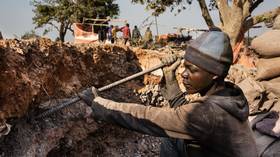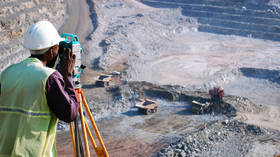US tech giants cleared in cobalt child mining case

The US Court of Appeals for the District of Columbia has dismissed a petition to hold Apple, Google parent Alphabet, Dell Technologies, Microsoft, and Tesla liable for allegedly aiding child labor in cobalt mining operations in the Democratic Republic of the Congo (DR Congo).
The federal court, in a 3-0 decision on Tuesday, ruled in favor of the five major tech companies, rejecting the appeal filed by 16 plaintiffs, including former DR Congo child miners and their lawyers. Representatives of five children who died as a result of mining cobalt are also involved.
The Central African state is the world’s leading producer of cobalt, a critical component in batteries used in most consumer electronics, such as mobile phones and electric vehicles. Several thousand children are recruited to work in hazardous conditions in cobalt mines in the former Belgian colony, according to the International Labour Organization. One of the plaintiffs in the lawsuit against the American corporations is said to be among many others who have been paralyzed after falling into mine pits or tunnels collapsing on them.
The complainants accused the firms of collaborating with suppliers in a “forced labor” venture to meet their growing demand for the metal. They claimed that hunger and extreme poverty forced many of the children to work.
“Although we conclude that the plaintiffs have standing to pursue their damages claims, they have failed to state a claim for relief,” the judges concluded.
“Without more specific allegations, the question is whether the tech companies’ purchasing an unspecified amount of cobalt from a supply chain originating in DRC mines plausibly demonstrates ‘participation in a venture’ with anyone engaged in forced labor in that supply chain,” Circuit Judge Neomi Rao wrote.
Under federal anti-trafficking law, “purchasing an unspecified amount of cobalt through the global supply chain” is not “participation in a venture,” Rao said, adding that Apple and others only maintained a commercial relationship with their suppliers.
In November 2021, US District Judge Carl Nichols dismissed the case filed by nonprofit International Rights Advocates (IRA) on behalf of child miners, citing a lack of merit, prompting an appeal.
IRA Director Terry Collingsworth and a lawyer for the plaintiffs said the ruling on Tuesday provides “a strong incentive” for the tech firms to “avoid any transparency with their suppliers,” Reuters reported, citing an email.
“We are far from finished seeking accountability,” he said, adding that his clients could file new appeals.













